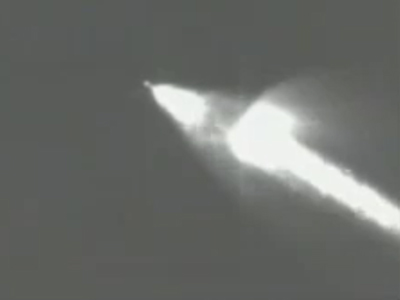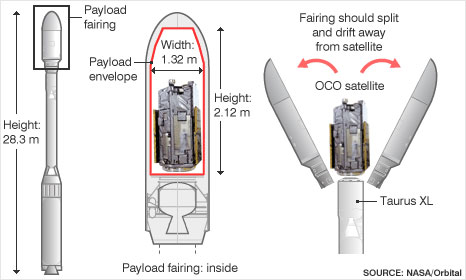American satellites plunged into the sea
Yesterday, the US CO2 emission satellite named Orbiting Carbon Observatory (OCO) fell to the area near Antarctica, shortly after leaving the launch pad due to technical problems.

OCO plunges into the sea a few minutes after leaving the launch pad.Photo: AP.
Hundreds of people have previously witnessed Taurus missiles flying into space from Vandenberg air base. But just a few minutes after flying up, the satellite fell into the ocean. The US Space Agency (NASA) owns the satellite confirming the incident, and said it originated from a cone-shaped tip protecting OCO during flight through the atmosphere.
The OCO satellite was launched into earth orbit with the Taurus XL - the smallest missile that NASA is using and built by Orbital Sciences Corporation. John Brunschwyler, a representative of the manufacturer of satellite boosters, also acknowledges that the tip of the cone is the cause of the accident.
"The conical nose should have split and fallen after 3 minutes since the missile left the launch pad, but that doesn't happen. This part takes up quite a large proportion of the volume compared to the entire satellite. so when the cone is not detached, its mass makes the missile unable to reach its expected orbit, " he explained.

The cone tip of the boosters does not detach as the design leads to the incident.Photo: NASA.
Since its introduction in 1994, Taurus XL missiles have made eight launches of satellites and spacecraft, including two failures including yesterday's incident. This is also the first time NASA uses Taurus XL boosters and has problems. An investigation committee will be set up to find out what caused the OCO to plunge into the sea.
The US $ 280 million OCO satellite is designed to study global warming to answer questions such as what happens to carbon dioxide by burning coal, oil and natural gas. , plants, soil and oceans absorb as much as carbon dioxide and how much is retained in the atmosphere.
In the past decade, many scientists have complained that the number of earth research works from space is decreasing. They claim that NASA spends too much money on understanding other planets without paying attention to our own planet. In addition, satellites designed to study Earth are relatively "old" compared to many other satellites.
- American company launches satellites visible from Earth
- Satellite Rosat rushes into the earth's atmosphere
- 29 satellites are launched at the same time
- Vietnam satellite will enter space in 2018
- The satellite crashed each other to threaten the universe
- Korean artists make satellites themselves
- Vietnam will produce satellites in 2022
- Iran launched 3 satellites in the next 6 months
- India successfully launched seven satellites into orbit
- Proton Russian missiles successfully put American satellites into orbit
- American artificial satellites fall on the following weekend
- Europe has successfully launched two telecommunications satellites
 Van Allen's belt and evidence that the Apollo 11 mission to the Moon was myth
Van Allen's belt and evidence that the Apollo 11 mission to the Moon was myth The levels of civilization in the universe (Kardashev scale)
The levels of civilization in the universe (Kardashev scale) Today Mars, the sun and the Earth are aligned
Today Mars, the sun and the Earth are aligned The Amazon owner announced a secret plan to build a space base for thousands of people
The Amazon owner announced a secret plan to build a space base for thousands of people